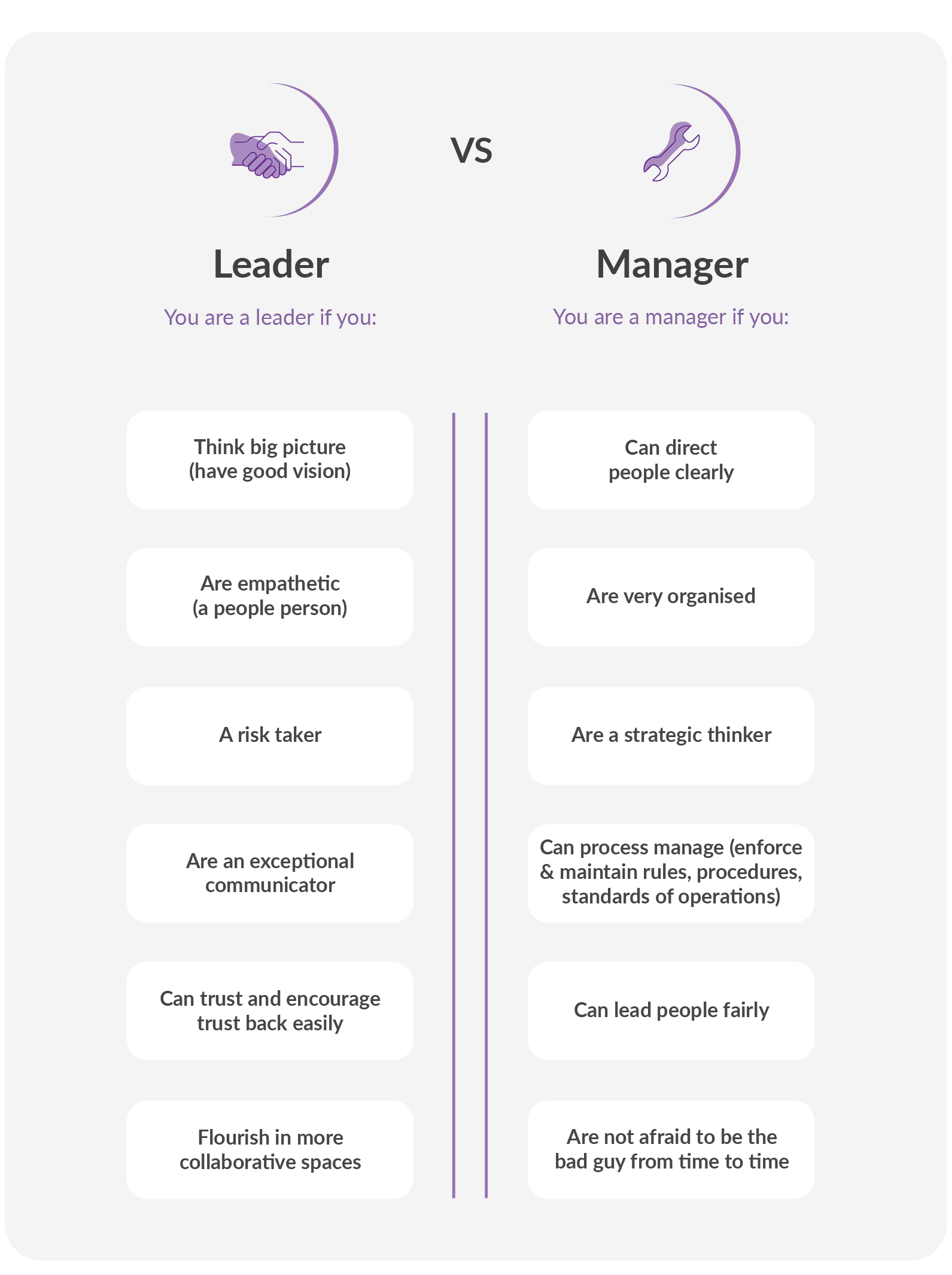In this post
Leader vs Manager: What’s the Difference and Which is Better in the Workplace?

Managers and leaders both bring critical traits and skills to the modern workplace. What’s important is the ability to identify the differences between a leader and a manager and when one is needed more than the other.
If you’re aspiring to move up in the ranks and move into a senior position, you may be starting to consider what sort of presence, skills and traits you want and need to bring to the table.
Do you need to be the go-to person for the black and white answers? Or, do you need to be the driving force behind inspiring forward motion or change? Maybe you need to be both?
The difference between managing and leading comes down to different methods of reaching what is (usually) the same end goal. Arguably, both are required to strike the necessary balance of direction and inspiration.
It can be challenging to determine when which role will be more beneficial and for whom. That’s why it’s incredibly valuable to understand both. The good news? It’s possible to learn and develop the skills needed to nail the difference between good managing and good leading.
The skills, traits and qualities of leaders vs managers
Managers are usually very analytically inclined. They tend to focus predominantly on the business’ short-term goals and objectives through predetermined concrete strategies. Their approach towards other employees is often instructional to establish a boss-subordinate dynamic.
Leaders tend to be more future and long term goals driven. They aim to inspire collaboration and unity to work towards the business’ ultimate business mission. Most leaders adopt horizontal management, choosing to enter all workspaces rather than working from a separate corporate silo.

Should you be a leader or a manager in the workplace?
It’s not fair to say a manager or a leader is better than the other.
Both have critical skills required to lead a business to success no matter the bumps in the road. However, there are certain circumstances where one set of traits can be more beneficial than the other. It’s important to remember that:
Leaders are best when:
- Collaboration and inspiration need to be encouraged
- Employees need extra personal support from their superiors
- Future goals and ideation need to be prioritised
Managers are best when:
- Crucial day to day operations need to be managed for the health of the business
- People need strict direction to execute certain strategies
- Employees are falling short of their duties due to purposeful negligence
This can clearly be seen in the following scenarios:
Scenario 1: It’s better to be a leader when your workplace culture or environment needs an attitude shift.
Sometimes workplaces grow stagnant, and employees can grow resentful of their ‘daily grind’. It’s here when a leader should step in and breathe new life into the company culture. Leaders can inspire employees to be excited about the ‘bigger picture’. By fostering a new sense of understanding and purpose towards the business’ mission statement, workplace morale lifts.
Scenario 2: It’s better to be a manager when daily administrative processes aren’t being completed correctly, causing the possibility of larger future problems.
If critical daily processes aren’t up to scratch, much larger, more serious issues can occur. Managers can strategise and direct with a purpose to quickly and efficiently fix these issues. Under these circumstances, an order-and-follow process is required to avoid more panic and confusion.
Scenario 3: It’s better to be a leader when you’re running an ideation or work in progress (WIP) meeting to help inspire and motivate your team.
WIP meetings and ideation collaborations need to be led, not managed. Team members need to feel excited enough to spitball ideas from left-field. As well as safe enough to admit a project is experiencing issues and ask for help. Employees and senior staff alike receive much more value from these meetings if a good leader is at the helm.
Scenario 4: It’s better to be a manager when employees are taking advantage.
Sometimes employees ruin a good thing by being purposefully negligent towards their duties. They may be taking advantage of certain perks or abusing their independence in the office, and skirting their responsibilities. A manager is more likely to notice this sort of behaviour due to their focus in the office. Managers are also usually more prepared and willing to “be the bad guy” and deal with these situations via standardised procedures.
Can you learn to be a leader or manager?
Before engaging with a managerial or leadership role, you must be equipped with the correct skills, strategies and confidence. People in roles of power should understand how their behaviour and presence can determine the future success of their team and the business as a whole.
Taking part in leadership and management training is an invaluable and straightforward way to achieve these otherwise hard-to-grasp qualities. Short courses will equip you with the necessary tools and skills required to:
- Handle workplace conflict
- Balance inspiration and practical operations
- Visualise for the future while filling the space between the now and then with manageable processes and strategies
Most modern workplaces will identify that a manager with leadership qualities make for the best senior point person in a business. So, if you’re inclined towards one or the other, it’s in your best interest to diversify and nail both skillsets to get the best of both worlds!
Whether you’re more well-suited to management or leadership, both roles play an essential part in the success of any business. Most importantly, with the correct tools, materials and education, you can fill your arsenal with all the invaluable traits and skills required of a diverse and intuitive managing leader.
Ready to elevate your career and step into a senior role with confidence?
Latest Articles
Agriculture Careers: What You Should Know in 2025
As one of Australia's most important industries, the agriculture industry offers great career opport...
Are Digital Skills the Key to Job Security in 2025?
The digital revolution is here, and it doesn’t care if you have a technical job or not — it’s coming...
How to Become a Chef in Australia: Complete Guide for 2025
The complete guide to becoming a chef in Australia. Learn how to get your start and make it in the h...
Want to read more?
Why Should I Study a Xero Course?
The world of business and finance is constantly changing, so it’s paramount to keep up to speed with...
How Cyber Security Training Can Unlock Your Career Opportunities
Are you ready to take your career to the next level and dive into the exciting world of cyber securi...
The Great Healthcare Resignation: What It Means for Healthcare & Social Assistance Workers
We asked community services and healthcare workers what's going on — here's what you need to know ab...
